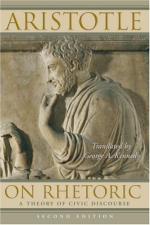
|
| Name: _________________________ | Period: ___________________ |
This quiz consists of 5 multiple choice and 5 short answer questions through Book II, Chapters 1-11.
Multiple Choice Questions
1. How many forms did Aristotle think the emotional appeal could take?
(a) Two forms.
(b) A variety of forms.
(c) Only a few specific forms.
(d) One form.
2. According to Aristotle, what was the orator's chief goal?
(a) To provide enough facts to support their argument.
(b) To make a sound argument.
(c) To discredit any opposing arguments.
(d) To convince the audience to make a certain decision.
3. Why did Aristotle think the completion of a difficult task was pleasant?
(a) What is diffcult to get requires dedication that makes it more rewarding.
(b) What is difficult to get is always better than what is easy to get.
(c) What is difficult to get requires extra effort that makes it more rewarding.
(d) What is difficult to get is mostly better than what is easy to get.
4. What type of argumentation did Aristotle think the dialectic should be associated with?
(a) Proper and valid.
(b) Simple and valid.
(c) Proper and simple.
(d) Proper, simple, and valid.
5. Which of the following did Aristotle think were more likely to commit crimes?
(a) Clever people.
(b) Ignorant people.
(c) Weak people.
(d) Malicious people.
Short Answer Questions
1. How many causes of human action did Aristotle detail in Book I, Chapter 10?
2. In Aristotle's description of fear, what was the opposite of fear?
3. In the beginning of the book, which one of the following did Aristotle indicate about rhetoric?
4. Based on the information in Book I, Chapter 12, when did people commit crimes?
5. Included in Aristotle's definition of a rhetorician, which parts of a claim should be adapted to a situation?
|
This section contains 341 words (approx. 2 pages at 300 words per page) |

|




